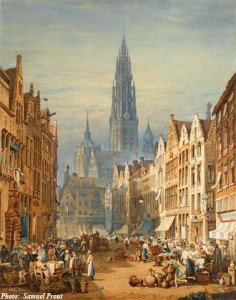
A lady recently wrote me with a question about the role of material things in life. She was confounded by apparent contradictions between living a pious life while enjoying material things that are all around us.
She had read the stories of the saints and how they often scorned material things. Since we are all called to be saints, she reasoned, then eventually we must all adopt a life detached from the world like that of monks, nuns or priests. However, this is difficult to do because people derive joy from eating, buying things or enjoying beautiful music, for example, all of which are normal activities for those living in society.
The dilemma is compounded by the fact that the legitimate joys and desires of material things are not sinful in themselves yet seem to be harmful. Thus, many find themselves vacillating between the two extremes of “secular” and religious desires. The enjoyment of material things gives rise to guilt and blame. People are even encouraged to live a frugal and austere life surrounded by misery and ugliness as a means to become holy
The battle between material and spiritual, temporal and religious, has always triggered debate in the Church. On her part, the Church has always responded with balance and common sense. If some saints scorned material things, it was because they represented something good that could be given up, not something evil that must always be rejected.
The fundamental assumption of the question I was asked is that somehow the material universe is in contradiction with the spiritual world and, therefore, bad. Such was the position of the ancient Gnostics who viewed all matter as evil.
However, the question of the lady does not plumb those depths of the debate. She does not want to go into complex dialectics of spirit and matter. She only wants to know if she might enjoy food, music or any other material pleasure that she finds in her path. She wants to know if these are necessarily obstacles to sanctification.
The Nature of Material Goods
Material goods are hardly obstacles. God created the material universe for our good. He would not be a just God if creation was a constant temptation for our salvation. Thus, the first thing to be established is that there is no inherent contradiction between the spiritual world and material life. In fact, the enjoyment of material things is not only good but can even be helpful toward reaching sanctification.
Obviously, our fallen nature is such that we can abuse material things and develop exaggerated attachments to them. However, this can also happen to spiritual things. The balanced position is the practice of the virtue of temperance whereby man governs his natural appetites and passions in accordance with the norms prescribed by reason and faith. When we use things with temperance, they help us become holy.
Creation Reflects the Creator
And that is why created things are important. Creation speaks to us of the Creator. Since we cannot see God, we can only gain an idea of what God is like by analogy of what we see. We have a better idea of God’s grandeur, for example, by coming to know the majesty of the sea. We can have a glimpse of God’s might by coming to know a strong, grand oak tree. God’s infinite immensity is reflected in vast firmaments of the heavens at night.

The basis of such an affirmation can be found in Saint Thomas’ fourth way of proving the existence of God whereby we come to know God by his traits we see in creation. This way asserts that God created a whole universe to reflect himself since no one creature could sufficiently mirror him. Each creature reflects something of the goodness, truth, and beauty that God is. When we contemplate this finite work of creation, we grasp better God’s infinite perfection and experience the great spiritual joy of understanding the order and meaning of things (Summa Contra Gentiles, II, 45; Summa Theologica, I, q. 47, a. 2).
That is to say, by seeking the excellence of material things, we can better come to know and love God. We better understand ourselves and the meaning of life.
The Teaching of Saint Bonaventure
The teaching of Saint Thomas is echoed by that of his medieval contemporary, Saint Bonaventure, the Franciscan theological giant. In his great work, The Mind’s Road to God, the saint goes one step further by calling the world “a ladder for ascending to God,” where we find “certain traces (of his hand),” and we are thus “led into the way of God.” In this case, material things are not just helpful aids but necessary steps that can take us to God.
What Does Saint Thomas Say About Immigration?
The saint claims that “all creatures of this sensible world lead the mind of the one contemplating and attaining wisdom to the eternal God.” He continues: “The invisible things of God are clearly seen, from the creation of the world, being understood by the things that are made; so that those who are unwilling to give heed to them and to know God in them all, to bless him and to love him are inexcusable.”
Clearly, temporal goods are means, not obstacles to sanctification. The saint claims they can be like wings that help us take flight to heavenly considerations.
Choosing the Right Things to Sanctify Oneself
Thus temporal goods are not the problem. It is our attitude toward them that is important. We must look upon temporal goods according to their nature. Thus, we are called to love those things most like unto God. We are called to seek after excellence and proportion in things because these qualities will direct us to God. At the same time, it is logical that we must reject those ugly and disproportional things that speak to us of disorder and sin. We must also never be satisfied with mediocre things that turn our minds away from God.
These criteria for what to seek is well expressed by the words of Saint Paul in Holy Scriptures that call upon us to look to high ideals when he says, “Finally, brothers, whatever is true, whatever is honorable, whatever is just, whatever is pure, whatever is lovely, whatever is gracious, if there is any excellence and if there is anything worthy of praise, think about these things” (Phil. 4:8).
Splendor of Christian Civilization
That is not to say that we must own all the things of excellence that we admire. Nor can we be attached to these things as an end rather than a means. Rather it is to have a soul turned toward the excellence these things represent. It calls upon us to appreciate the beauty, excellence and good that God puts in our path so that we might know and love him better. It asks us to employ these criteria so that when we make or do something beautiful, we help ourselves, and others reflect God better.

That is why Christian civilization has always striven to instill splendor and beauty into the common lives of men. The arts and crafts flourished in Christendom. Whether it be cuisine, music, liturgy or architecture, they all developed and moved toward perfection under the guiding hand of the Church. The culture belonged to everyone united as they were in the quest to know God. All these marvelous things were accessible to everyone, however humble since all could appreciate them and make them in some way a part of their quest for God.
The problem with modern civilization is that things have no meaning or common purpose in society outside of personal gratification. There is no final end that we seek to know. Thus, things are no longer means toward God but selfish ends. Moreover, our fallen nature tends to make us distort excellence and create a civilization that moves us away from the good, true, and beautiful. It creates a civilization that exalts the false, sinful, and ugly.
Answering the Question
Thus, we find the answer to the question. Yes, one can and should enjoy and delight in material things (even cuisine) since they are not obstacles that keep us away from God unless we make them so. They can become essential means towards our sanctification. Enjoyed with temperance, material things exist for us to know and love God more, and we err if we fail to do so.
[like url=https://www.facebook.com/ReturnToOrder.org]
For as Saint Bonaventure says: “He who is not illumined by such great splendor of created things is blind; he who is not awakened by such great clamor is deaf; he who does not praise God because of all these effects is dumb; he who does not note the First Principle from such great signs is foolish. Open your eyes, therefore, prick up your spiritual ears, open your lips, and apply your heart, that you may see your God in all creatures, may hear him, praise him, love and adore him, magnify and honor him, lest the whole world rise against you.”


